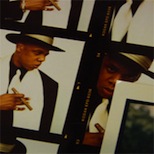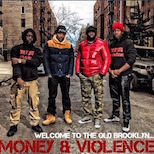Director Eugene Jarecki Tackles America’s Endless War on Drugs in “The House I Live In”
10.10.2012
LEISURE
Critically acclaimed filmmaker, author, activist, Eugene Jarecki’s 2006 seminal documentary Why We Fight –winner of the Grand Jury Prize at the Sundance Film Festival and a Peabody Award– dissected the anatomy of the American war machine. Last year, the award-winning director premiered Reagan, a film that explored the life, legacy and myths of the 40th president, on HBO to rave reviews. Now, with the same scalpel-like precision he’s administered in the past, Jarecki turns his eye to a less visible war on the nation’s home front in his new film The House I Live In.
Switching hats from director to journalist, Jarecki uses his own family’s escape of persecution from Nazi Germany, as a segue into his investigation. He introduces Nannie Jeter, an African-American woman raised in the South, who began working as the Jarecki’s housekeeper and caregiver after she migrated north to break free of the segregated Jim Crow laws of the ‘60s. Disturbed by Jeter’s family strife over the years, Jarecki traces her son’s death to drugs and embarks on a twenty state tour to uncover the harsh reality of a broken system that was put in place four decades ago.
The House I Live In captures heart-wrenching stories from individuals at all levels of the nation’s “War on Drugs.” From the dealer to the grieving mother, the narcotics officer to the senator, the inmate to the federal judge, the Jarecki’s film offers a comprehensive, yet penetrating scope inside America’s longest war that launched during the Nixon era. Executive Produced by Brad Pitt, Danny Glover, Russell Simmons and John Legend –with commentary from David Simon, creator of HBO’s hit-series The Wire– Jarecki demonstrates that the “War on Drugs” has never been about illegal substance abuse and treatment. It pertains more to the design of an industry that has disenfranchised and criminalized poor Americans and minorities, increasing the nation’s world-leading prison population, fattening up the pockets of those with interests in the trade.
After a successful opening weekend, in which the film made its premiere at the world famous Apollo Theatre in Harlem, USA, Life + Times caught up with Jarecki to cut through the misconceptions of the drug war in America, California’s Three-Strikes law, altruism and the takedown of a trillion dollar industry. The House I Live In is in theatres nationwide, now.
Life + Times: Nannie Jeter is the centerpiece of the film, but she is also a woman who helped to raise you. What made you want to investigate a story that was so close to home?
Eugene Jarecki: You know I haven’t done that before. I haven’t made a movie with that sort of autobiographical dimension to it at all. And it was even harder in this case. Here I am, a comfortable White guy, making a movie about the drug wars horrendous impact on Black America, and so I felt all the more insecure and questionable including myself, or any part of myself, on screen. I thought, the tiniest, minimal amount of myself, and my relation therefore to one of the central characters, was needed for an honest portrayal. I’m present in the film because Nannie Jeter is the focus of my way of understanding the beginnings of how the drug war began to affect Black American families. And of course after I began to understand her story, I grew my investigation into a nationwide investigation to understand, well if this is what drugs and the drug war had done to her family, what had this combination of demons done to the rest of the country? And so, I wanted people to know where I started, whom I was, where my initial investment was and therefore, they would understand the fuel for the much wider journey.
L+T: There have been several films in the past on the “War on Drugs.” Most of them just explored what was on the surface and didn’t dig deep, whereas in this film you have tackled every aspect of the system.
Jarecki: In my whole career, the one thing people say about my films, film after film, is that I do make very far-reaching, the often kind of definitive film on a subject. Historically in my life, I take on films with very big subjects and I tend to spend a lot of time on them and go very deep. I felt the drug war was a subject most close to my heart, because it’s a social justice crisis that I feel every day in my own country. There were other films that I wouldn’t say weren’t as valuable. Their premise was to advocate one specific kind of reform or another, whether it was the Rockefeller Drug Laws or another part of our insane regime of laws in this country. That has it’s place, but I wanted to recognize that someone needed to put this “War on Drugs” in historical and fuller perspective, so that Americans can understand it as the horrible, national secret that it is. And that’s why I went to so many states, ‘cause I wanted to make sure nobody said, ‘Oh, that’s just shot in Baltimore or that’s just shot in Newark or that’s what’s going on in Chicago.’ I wanted them to say, ‘No, this is happening in cities all over America, it’s happening in the rural heartland of America and it’s coming to a theatre near you.’
L+T: You exposed several other issues in your investigation, especially the economic factors, flooding inner city neighborhoods with drugs to funnel minorities and the poor into the prison system to maintain a multi-trillion dollar industry. What challenges did you face along the way?
Jarecki: Well there’s no question when trying to get inside a machine with a dark inner story and a dark agenda, you’re going to face resistance, you’re going to face opposition from people who want to block you from getting inside the engine room. And so, we expected that. What I did not expect was a more surprising phenomenon that emerged… which was how open people were with us. That people would let us inside of their prisons. I had cops tell me from their patrol cars that this is broken. I had judges tell me from their chambers that ‘my hands are tied by these laws that have been passed by congress.’ those have been the kind of experiences that were the most eye opening and weirdly inspiring. I mean, is it shocking that we run this gulag system and call this place a democracy? Is it shocking that we have 2.3 million people behind bars, more than any other country in the world? Yes, that’s shocking and despairing. Is it despairing that we’ve had the drug war for 40 years, spent a trillion dollars on it, have done 45 million drug arrests and we have nothing to show for it, except that drugs are cheaper, more available, purer and more in use by younger people than ever before? That’s shocking and terrible. So the shocking is unbelievably shocking. But the surprising is incredibly inspiring.
L+T: Speaking of inspiring, the film has several big name supporters from Brad Pitt to Danny Glover to John Legend and Russell Simmons. How were you able to build such a roster and get them to be involved?
Jarecki: The people attached to the film; John Legend, Danny Glover, Russell Simmons and most recently Brad Pitt, all came on board through relationships I had with each of them that was based on the substance of the work. All of them are long distance runners for social justice. Each person on that list is somebody’s whose life is in part or significantly devoted to pursuing social justice causes and they see the drug war as a leading social justice concern in America. And so, I reached out to them for help along the way with the film. For creative help and for ideas to help me get passed certain obstacles. The reason why I’m so touched the Brad Pitt, Danny Glover, John Legend and Russell Simmons came on the film is that they’re helping people say, ‘look, this guy like this, Russell thinks this is important, therefore I’ll watch it. Brad, thinks it’s important, therefore I’ll watch it.’ Where their star power comes in is where it really matters.
L+T: David Simon, the creator of HBO’s definitive series The Wire, is also a prominent figure in the film. How important was it to have his voice in the film?
Jarecki: David Simon is in a class by himself. And the contribution he makes to my film is really unique and I think that David Simon is a national treasure. I think more people have come to think much more on the war on drugs because of his contribution to The Wire and also as a journalist.
L+T: You recently premiered the film at the world famous Apollo Theatre in Harlem, New York. How important is it to screen the film in neighborhoods that are most affected by the drug war?
Jarecki: It’s the most important thing we can do. Otherwise, we just play the same game that capitalism and modern lies plays any way. Which is to separate all of us, like sections in the record store. Films are almost never disturbed to the inner cities because it’s assumed that there wouldn’t be interest in a documentary. Forget that most films are directly about their lives. Therefore it’s incumbent of my team and I to cut out the middleman and just distribute to those areas directly. That’s why I hold screenings all over the country, in inner city neighborhoods, in the heartland, where there a poor White meth addicts, who are suffering from families being destroyed by the drug laws that so long damaged Black Americans. I try to get into communities of color of course because those are constituents that have been so deeply affected by this. Who need to have more of a voice. Who need to understand the issues as well as they possibly can. And so whether it’s showing at the Apollo, we’re also showing in L.A. –where will.i.am is working with us to bring the movie out there– we just came back from Oakland, and we’ll be doing this all over the country because it’s my job to get it out there as widely as I can, where my hands are not tied by the patterns of behavior of the commercial movie industry, which has a different agenda than I do.
L+T: What do you see as the solution for change?
Jarecki: The 400 richest Americans today have more money than the bottom 130 million. So once you know that you live in a society that has that kind of class gap in it, where the power over the country’s decision making is so concentrated at the top, you understand that there’s a large democratic crisis. The promise of democracy, where we all have equal voice, that we all have equal justice under the law and all of that, we know that that has become absurd and laughable. Every day people need to challenge their political leaders to get behind this subject, but they also need to take the law in their own hands and get behind millions in their area that are fighting individual aspects of the war on drugs. On a national level, we want to make the “War on Drugs,” a dirty word, that we should never say again in polite company because it was such a failure and such an abuse on human life. On a local level, there are pieces of legislation all over this country that can be changed that will matter a lot in the lives of people. A lot of this is on our website but it’s one way people can put in their zip code, on the site, and learn, what’s going on in their area.
L+T: Like what’s going on in California with the Three-Strikes law…
Jarecki: Exactly. In California, because of the Three Strikes law going on right now, you can go to jail for life on a third felony that’s petty or non-violent. Americans must know that the Three Strikes law might be changed in California this November because voters are voting to adopt Proposition 36, that would require the third strike to be series or violent. It would be a major and important change in the law. It would be humane, smarter law enforcement and it will save the state $150 million dollars at a time every state wishes to do so.
L+T: You’re heavily involved and engrained into every cause that you have produced. What’s next for you?
Jarecki: To be honest, this has become a departure from the rest of my filmmaking career. Usually my answer to that is, ‘Oh, my next film is going to be on such and such.’ But as I saw how important this was; as I saw many political films, many issue based films come and go with less impact, than I hoped they would have, by any number of filmmakers, it left me with the impression of what I most have to do was to work this issue once the film was done. I had to deploy the film in communities across this country. I took myself and my entire team off the grid of producing another movie for the foreseeable future, the next year to two years. We will be spending every waking hour getting this movie out there and getting the topic of the need to reform the “War on Drugs” to be front and center in the national discourse. I have nothing on my plate that’s more important to that. And that’s what we’re devoting all our energy to going forward.





